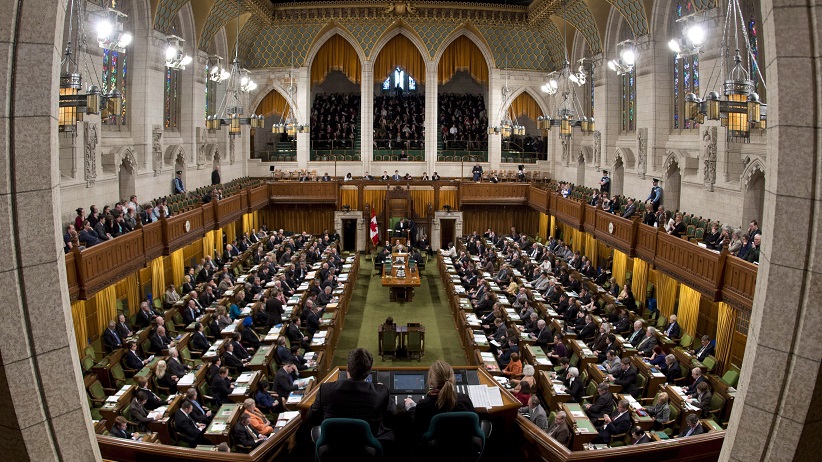Must-see QP: Pierre Poilievre has a new job, too
Your daily dose of political theatre
Share

Maclean’s is your home for the daily political theatre that is question period. If you’ve never watched, check out our primer. Today, QP runs from 2:15 p.m. until just past 3. We livestream and liveblog all the action.
The must-see moment
A few things are sure to happen every day in Ottawa during a parliamentary session: the sun rises, the sun sets, and somewhere in between, a New Democrat waxes furious about the government’s inattention to unemployed Canadians. Yesterday, as Employment Minister Pierre Poilievre took his seat on the front benches for the first time, none of the haranguing he might have expected came to pass. The NDP benches spared Poilievre a single question on employment. Not for long: this afternoon, NDP MP Irene Mathyssen mounted a lectern and put an end to any short-lived détente. Thus opened the latest chapter in a long parliamentary tradition of gotcha!, which requires a close reading of Hansard and a quotation from long ago meant to embarrass a political opponent.
“Mr. Speaker, in December 2004, the member for Nepean-Carleton told the House that it was ‘not politicians who create jobs,'” said Mathyssen. “It’s an odd statement, given he’s now the jobs minister.” Her benches chuckled at the irony, a trademark element of every game of gotcha! Mathyssen, of course, didn’t quote Poilievre’s complete thought from 2004, when the House was seized with a budget bill:
On this side, we believe in economic freedom, that it is individuals, not big government, who create wealth. It is entrepreneurism, not politicians, who create jobs.
Poilievre meant to reinforce a speech delivered minutes prior by his colleague, then-Tory MP Monte Solberg, whose intervention on the budget bill carefully picked apart the Liberal record on productivity growth. Solberg said lower taxes would help improve productivity—and could, at the same time, increase government revenue. He took recent Liberal tax cuts, which he considered “very tepid,” as a case in point.
We had finance officials expressing surprise that corporate tax [revenues] were going up and had gone up dramatically, even though corporate taxes had been cut. That is not counterintuitive to me. That makes sense because all of a sudden these businesses have the capital that allows them to expand, which then helps them to generate more profits. It also means that they hire more people, because those people go out and gather more business for them or produce more for them and ultimately make them a profit. And of course those people who were hired pay more taxes, too.
The Solberg-Poilievre exchange boils down to one among many conservative arguments for small government. But Poilievre wasn’t simply putting down your average politician’s job-creation bona fides; he was expressing basic deference to business. Whose opinions matter to a jobs minister who’s spent most of his working life in the House of Commons? Those words from 2004 offer a big hint.
The recap
The context
You’d be forgiven for forgetting yesterday that Pierre Poilievre, the newest member of the government’s front bench as its jobs minister, had a new gig. Poilievre mostly watched question period from his new seat, way down the aisle from Speaker Andrew Scheer. Twenty-six cabinet ministers and Tory MP Steven Fletcher sit between Poilievre and Scheer. He’ll be easy to miss every time Stephen Harper and Tom Mulcair bark at each other in the middle of the big room.
Yesterday, were it not for Jean-François Fortin, the former Bloquiste who now sits with the tiny Forces et Democratie caucus of two, Poilievre could have twiddled his thumbs for 45 minutes. New Democrats had Jason Kenney on his feet relentlessly when he was employment minister, but they took the day off the file, and the Liberals beside them did the same. Fortin, exasperated from his back row, had the day’s final two questions. In his second, he claimed that Service Canada workers “use practices intended to discourage the unemployed from claiming employment insurance benefits.” His question was to no one in particular, but fell into Poilievre’s lap: “When will the government treat workers who lose their jobs as people who deserve respect and not as people to be fleeced?”
Poilievre might, on any other day, have dredged up an ovation-worthy, biting, comeback sopping with partisanship at Fortin’s expense. He relishes those moments. But he remained calm in his maiden response as minister. “Mr. Speaker, I want to begin by thanking the Prime Minister, my constituents, and all Canadians for the opportunity they have given me to serve the public in my new role,” said Poilievre. “Our system is very generous to the unemployed. We are working to provide them the benefits to which they are entitled. We are in the process of reducing the waiting period for receiving benefits, and we will continue to do so.”
A quiet launch of Poilievre’s latest mission. Surely, this calm cannot last.